 W
WJohann Freiherr von Appel, was an Austro-Hungarian general and administrator. He was the Austrian governor of Bosnia and Herzegovina between 1882 and 1903.
 W
WGeneraloberst Arthur Freiherr Arz von Straußenburg was an Austro-Hungarian colonel general and last Chief of the General Staff of the Austro-Hungarian Army. At the outbreak of the First World War, he commanded the 15th Infantry Division. Soon, he was promoted to the head of the 6th Corps and the First Army. He participated on the Gorlice–Tarnów Offensive in 1915 and the countryside of Romania in 1916. In March 1917, he became Chief of the General Staff until his resignation on 3 November 1918.
 W
WAlbert Bartha de Nagyborosnyó was a Hungarian military officer and politician, who served as Minister of Defence twice: in 1918 and, almost thirty years later, between 1946 and 1947.
 W
WVitéz Károly Bartha de Dálnokfalva was a Hungarian military officer and politician, who served as Minister of Defence between 1938 and 1942. During World War I, he had several high commander offices in Budapest and Trieste. In 1919, he fought against the armies of Czechoslovakia and Romania. After the fall of the Hungarian Soviet Republic, Bartha joined the National Army led by Miklós Horthy. Béla Imrédy appointed him as Minister of Defence and Bartha kept his position in the ensuing governments until 1942.
 W
WFerdinand von Bauer, born Ferdinand Bauer was a general of the Austro-Hungarian Common Army and the Imperial and Royal Minister of War from 1888 until his death in 1893.
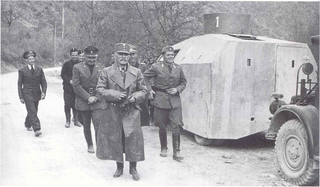 W
WVilko Begić was a Croatian military officer.
 W
WSándor Belitska was a Hungarian military officer and politician, who served as Minister of Defence between 1920 and 1923. During the World War I he fought on the Eastern Front. After the war he lived as a nobleman, he was a member of the National Casino and Vice-Chairman of the Royal Hungarian Car Club, leader of the Dove-shooter Association and Director of the Sports Club of Margitsziget.
 W
WLudwig August Ritter von Benedek, also known as Lajos Benedek, was an Austrian general (Feldzeugmeister) of Hungarian descent, best known for commanding the imperial army in 1866 in their defeat at the Battle of Königgrätz against the Prussian Army, which ended his career.
 W
WKároly Beregfy was a Hungarian military officer and politician, who served as Minister of Defence in the 1944–45 Arrow Cross Party government.
 W
WAdolf von Boog was an Austro-Hungarian Army officer who served in World War I, holding senior positions in the General Staff and commanding field units, and later was briefly the commander-in-chief of the Volkswehr of the new postwar rump state of Austria.
 W
WPaul Freiherr Puhallo von Brlog was a general of Austria-Hungary. During World War I, he commanded the Austro-Hungarian Army's 3rd and 1st Armies.
 W
WArtur Maximilian von Bylandt-Rheidt was an Austro-Hungarian General of the Artillery and Imperial and Royal Minister of War from 1876 to 1888.
 W
WBernhard Caboga-Cerva was a count and general from the Austrian Empire. He was born in Dubrovnik in 1785 and was a descendant of the Ragusan family of Caboga.
 W
WCarlo Caneva was an Italian general, known for having led the conquest of Libya in the Italo-Turkish War.
 W
WKarol Durski-Trzaska (1849–1935) was an officer in Austro-Hungarian Army and later, Polish Army. Reached the rank of Lieutenant General (Feldmarschalleutnant) in Austrian-Hungarian Army; commander of Austrian Polish Legions in World War I from 23 September 1914 to December 1915. Transferred to reserve afterwards. He served in the Polish Army from 1919 to 1922, in reserve again afterwards. Recipient of the Silver Cross of the Order of Polonia Restituta and the Commander's Cross of the Polonia Restituta.
 W
WErnest Augustus, Crown Prince of Hanover, 3rd Duke of Cumberland and Teviotdale, was the eldest child and only son of George V of Hanover and his wife, Marie of Saxe-Altenburg. Ernest Augustus was deprived of the thrones of Hanover upon its annexation by Prussia in 1866 and later the Duchy of Brunswick in 1884. Although he was the senior male-line great-grandson of George III, the Duke of Cumberland was deprived of his British peerages and honours for having sided with Germany in World War I. Ernest Augustus was the last Hanoverian prince to hold a British royal title and the Order of the Garter. His descendants are in the line of succession to the British throne.
 W
WLiborius Ritter von Frank was an Austro-Hungarian general in World War I. He commanded the Austro-Hungarian Fifth Army in 1914 at the start of the war, and fought at the Battle of Cer, Battle of Drina and Battle of Kolubara. He was replaced by General Karl Tersztyánszky von Nádas after the failure of the first Serbian Campaign, the enormous casualties suffered by his army reduced to about 40% of its strength and the disbandment of the Balkanstreitkräfte.
 W
WArchduke Franz Ferdinand Carl Ludwig Joseph Maria of Austria was the heir presumptive to the throne of Austria-Hungary. His assassination in Sarajevo is considered the most immediate cause of World War I.
 W
WFriedrich Freiherr von Georgi was a General of the Austro-Hungarian Army.
 W
WArthur Freiherr Giesl von Gieslingen was an Austrian general officer during the First World War.
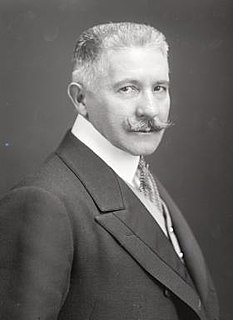 W
WWladimir Rudolf Karl Freiherr Giesl von Gieslingen was an Austro-Hungarian general and diplomat during World War I, most famous for delivering the ultimatum to the Serbian government during the July Crisis of 1914.
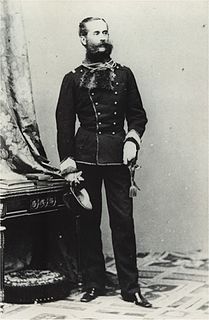 W
WLudwig Karl Wilhelm Freiherr von Gablenz was an Austrian general of Saxon origin.
 W
WKarl Ludwig Grünne, Count of Pinchard was an Austro-Hungarian general.
 W
WLeopold Freiherr von Hauer was a Colonel General in the Austro-Hungarian Army. He participated in the First World War on the Russian front.
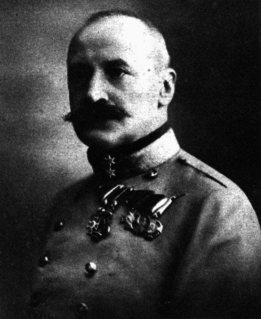 W
WKarl Georg Huyn was an Austro-Hungarian colonel general and the last military governor of Galicia during World War I.
 W
WFranz Freiherr von John was an Austrian Feldzeugmeister, Chief of the General Staff, and Minister of War.
 W
WKarl Freiherr von Kirchbach auf Lauterbach, from 1917 Count von Kirchbach auf Lauterbach, was a colonel general of the Austro-Hungarian Army.
 W
WAlexander von Koller was an Austro-Hungarian military officer, who achieved the rank of General of the cavalry and served as Imperial and Royal Minister of War from 1874 to 1876.
 W
WKonstantin Viktor Ernst Emil Karl Alexander Friedrich Prinz zu Hohenlohe-Schillingsfürst was a k.u.k. First Obersthofmeister and General of the Cavalry of Austria-Hungary.
 W
WEdmund Freiherr von Krieghammer was an Austrian General of the Cavalry and Imperial and Royal Minister of War of Austria-Hungary.
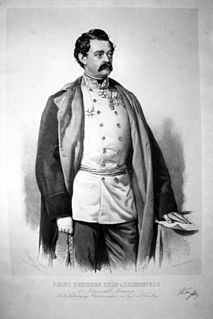 W
WFranz Kuhn von Kuhnenfeld was an Austro-Hungarian military officer who fought against Giuseppe Garibaldi in the wars of Italian independence and served as Imperial and Royal Minister of War from 1868 to 1874. During his term, a unified system of conscription for both Cisleithania and Transleithania was introduced, corporal punishment in military service was abolished, and the Franz-Josephinian Land Survey was initiated. He was a supporter of the Austro-Hungarian polar expedition and an opponent of the Austria-Hungary's 1879 alliance with the German Empire.
 W
WHermann Kusmanek von Burgneustädten was a colonel general of the Austrian Imperial Army. He gained particular fame during World War I by his defence from September 1914 to March 1915 of the fortress of Przemyśl against a Russian siege.
 W
WRobert Lamezan de Salins (1869–1930), also known as Robert Graf von Lamezan-Salins, was a Polish military officer and diplomat of aristocratic descent.
 W
WJoseph Freiherr Maroicic von Madonna del Monte was an Austrian general of Croatian descent.
 W
WArtur Edler von Mecenseffy was an Austro-Hungarian Army officer who held the rank of Feldmarschall-leutnant and served during World War I, becoming the highest ranking officer of Austria-Hungary to be killed on the battlefield.
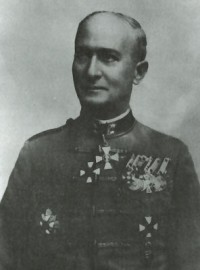 W
WIstván Náday was a Hungarian military officer, who served as commander of the Hungarian First Army during the Second World War. He was appointed a pedestrian lieutenant at the Ludovika Academy in 1908, and served in the Red Army in the First World War. After the war, he was a military academy professor, and worked his way up to general, then eventually commander-in-chief.
 W
WOskar Potiorek was an officer of the Austro-Hungarian Army, who served as Governor of Bosnia and Herzegovina from 1911 to 1914. He was a passenger in the car carrying Archduke Franz Ferdinand of Austria and his wife Duchess Sophie of Hohenberg when they were assassinated in Sarajevo on 28 June 1914, Potiorek had failed to inform the driver of a change of route which led the royal car to take a wrong turn and end up in front of Gavrilo Princip. In the following World War I, Potiorek commanded the Austro-Hungarian forces in the failed Serbian Campaign of 1914, he was removed from command retiring from the army shortly afterward.
 W
WStanisław Puchalski, of Puchała coat of arms was an Austro-Hungarian and Polish general.
 W
WWilhelm Freiherr von Ramming von Riedkirchen was an Austrian Feldzeugmeister who commanded an army corps during the Austro-Prussian War.
 W
WPrince Rudolf of Liechtenstein was an Austrian aristocrat, a general in the Common Army and one of the highest officials in the court of Emperor Franz Joseph I.
 W
WJohann von Salis-Seewis also known as Johann Ulrich Graf von Salis-Seewis was an Austro-Hungarian military officer during World War I. An ethnic Croat, he commanded the Croatian 42nd Honvéd Infantry Division first as part of the unsuccessful Serbian Campaign of 1914 and then on the Carpathian Front. On his return, he became military commander of Vienna before serving as the first military governor of the Military General Governorate of Serbia during the Austro-Hungarian occupation. He later commanded the 92nd Landwehr Infantry Division during the Romanian campaign and headed the Supreme Command in occupied Romania. After the war, he retired to Zagreb, where he spent the rest of his life.
 W
WViktor Graf von Scheuchenstuel was a colonel general in the Austro-Hungarian Army. He was a general staff officer and division commander until World War I broke out. During World War I he was a Corps and Army commander serving in Serbia, Albania and Italy. During World War I he was promoted to Graf in the Austrian nobility. Following the end of World War I and the end of the Austro-Hungarian Empire, Scheuchenstuel retired from the military. He died in Vienna.
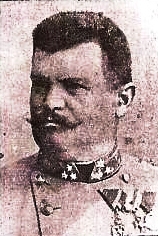 W
WBlasius von Schemua was an Austro-Hungarian general of Slovene descent.
 W
WBaron Josip Šokčević, was a Croatian lieutenant marshal in the Austro-Hungarian Army who served as the ban of Croatia and as the governor of the Voivodeship of Serbia and Temes Banat.
 W
WVitéz Károly Soós de Bádok was a Hungarian military officer and politician, who served as Minister of Defence in 1920. He participated in the working of revolutionary counter-government organizations on Szeged against the Hungarian Soviet Republic. Soós became the first Chief of Army Staff of the National Army.
 W
WRudolf Freiherr Stöger-Steiner von Steinstätten was a colonel general in the Austro-Hungarian army and served as the last Imperial Minister for War not only to the Austro-Hungarian Empire but also to the ancient Habsburg monarchy which sat at its head.
 W
WCount Stanisław Maria Jan Szeptycki was a Polish count, general and military commander.
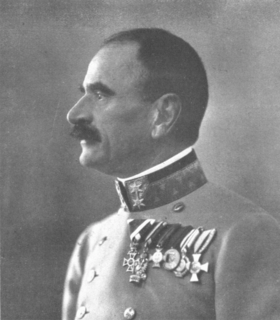 W
WKarl Tersztyánszky von Nádas, officially Károly Tersztyánszky, also alternatively written Tersztyánszky de Nádas was an Austro-Hungarian general who served in World War I.
 W
WIgnaz Trollmann von Lovcenberg, was a general in the Austro-Hungarian Army during World War I and commander of the 19th Corps.
 W
WAlfred Georg Heinrich Maria Freiherr von Waldstätten was an Austro-Hungarian Army officer holding the rank of Generalmajor who served during World War I. He held senior positions on the Armeeoberkommando and possessed significant influence over the Chief of General Staff, Arthur Arz von Straußenburg, and Emperor Karl.
 W
WViktor Weber Edler von Webenau, General in the Austro-Hungarian Army during World War I, military governor of Montenegro between 1916 and 1917 and head of the Austro-Hungarian armistice commission
 W
WWenzel Freiherr von Wurm was a Colonel General in the Austro-Hungarian Army.